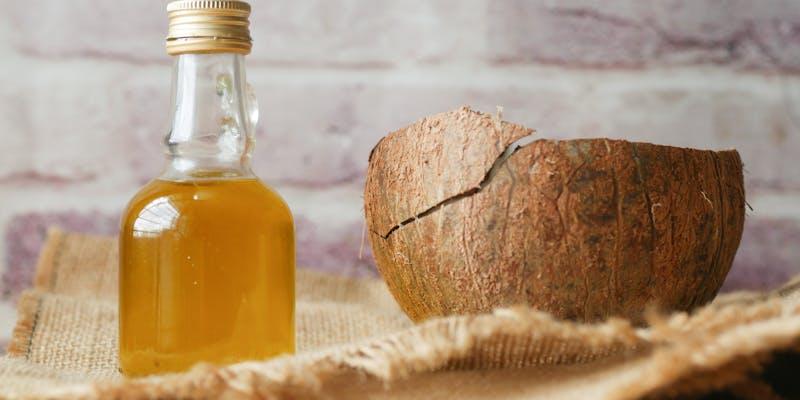Jojoba and coconut oils have been utilized for eons. We depend on them for numerous things. They are indispensable to our existence, whether employed in the kitchen or as hair oil. Regarding the frequency of use in cooking and pastry, coconut essential oil ranks highly. Coconut oil was the initial and most used hair oil.
On the other hand, jojoba seed oil has become an essential component of numerous contemporary cosmetics. Owing to the expansion of knowledge in the cosmetics industry, consumers know these oils' miraculous properties and true applications. Before determining which is best for you and why, let's examine two of the most well-known oils
Overview

Jojoba
Natural Moisturizing Factors (NMF) status is attributed to the emollient properties of golden jojoba oil. It closely resembles sebum, the natural lubricant of your skin. NMFs improve the health of the skin by impeding the development of irritation in deeper layers. The antimicrobial and therapeutic properties of NMFs are further enhanced by their impact on the skin's immune and healing systems. ANFs facilitate this process by mitigating the detrimental effects that impede skin regeneration and repair, such as dehydration and excessive irritation. Despite being commonly labeled as an "oil," Jojoba is a liquid lubricant. An additional investigation is necessary to validate the anti-inflammatory properties of jojoba.
Coconut
Coconut oil possesses emollient properties for the skin despite not being classified under the same category as NMFs. Furthermore, emollients aid in the softening and soothing the skin, as they prevent water loss. Based on scientific research, biologically active components in coconut essential oil may accelerate the healing of minor lesions. Coconut oil reportedly well-hydrates the parched skin. Moreover, research has demonstrated that this all-natural oil can inhibit pathogens, support wound recovery, and decrease inflammation when applied topically.
Composition
Jojoba Oil
Golden jojoba oil is unique and wonderful compared to other oils. As a wax ester, It differs from other plant-based oils. It's cleaner and more stable than alternatives. It regulates skin oil levels well since its composition is similar to human sebum.
- Vitamin E is necessary for skin renewal and moisture maintenance.
- Copper and zinc support the skin's outer layer.
- The long-chain fatty acids are anti-inflammatory and hydrating.
Coconut Oil
Coconut oil is a typical triglyceride containing plenty of caprylic, lauric, and capric acids. These fatty acids improve skin due to their antibacterial and antifungal properties.
- High saturated fat intake hydrates skin.
- Medium-chain triglycerides (MCTs) absorb quickly.
- Vitamins K and E, termed "skin repairmen," are essential for healthy skin.
- Distinct chemical compositions make the two oils effective for skin care and health issues.
- Coconut oil is antibacterial due to its fatty acid makeup, and jojoba balances skin by mimicking sebum production.
Extraction Methods

Is cold pressing an option? Is that pushing an expeller? They mattera lotand aren't just flowery terms you gloss over while perusing labels.
- Cold Pressing: This process, often used with golden jojoba oil, involves removing the oil's inherent goodness by removing any heat during extraction. The organic skincare zealots among you will love this.
- Expeller Pressing: The expeller pressing process utilizes heat and is often used to extract coconut oil. Crushing the nuts to extract oil has the advantage of slightly increased yields and the risk of nutritional deterioration from heat exposure.
Sustainability Concerns
For a moment, let's discuss our affection for the earth. These oils are not found in any store; they occur naturally.
- Jojoba Oil: Jojoba is an environmentally friendly crop grown in dry areas since it uses so little water.
- Coconut Oil: Those beachy palms have a sinister side: coconut plantations. The excessive demand for coconut oil can potentially encourage unfriendly cultivation methods.
Skin Types and Their Needs
It may be a real challenge to understand all the different skin types. Jojoba and Coconut oils work well with various skin types thanks to their distinct qualities. Let's know this.
Jojoba Oil
- Dry Skin: To alleviate dry skin, try using jojoba oil. Its wax ester content makes it act like human sebum, which naturally hydrates the skin.
- Oily Skin: It works well on oily skin, which is ironic considering it controls oil production.
- Sensitive Skin: Reactive skin types find relief in its hypoallergenic characteristics.
Coconut Oil
- Dry Skin: Coconut oil treats dry skin well due to its high lipid content.
- Combination Skin: Apply a little to the T-zone and other sensitive areas of combination skin.
- Sensitive Skin: The high fatty acid content could occasionally lead to breakouts. Therefore, sensitive skin should exercise care.
Potential Side Effects
Although oils are often considered harmless, even Mother Nature may be unpredictable. Be wary of the following possible exceptions:
Jojoba Oil
While uncommon, such occurrences do transpire, especially among individuals with nut or seed allergies. Using jojoba oil while pregnant or breastfeeding is generally safe; however, for specific recommendations, it is essential to consult a healthcare professional.
Coconut Oil
Pouch clogging is the primary concern associated with the use of coconut essential oil. As a consequence, pupils or blackheads may develop on specific skin types. Rash and irritation are infrequent occurrences, although they may transpire on occasion.
How to Make
Jojoba Oil
Making jojoba oil at home is slightly more intricate than producing coconut milk, owing to the scarcity of jojoba seeds. However, should you obtain these seeds, the process is incredibly straightforward.
- First, collect a few dried jojoba seeds.
- Use an oil press to press the seeds.
- An oil extraction method will extract seed oil. Refining oil follows pressing.
- Large particles may be swished with a cloth.
Shopping for jojoba oil might be more convenient than beneficial.
Coconut Oil
Coconut oil may be made at home using a few components and techniques. You just need a food processor and coconut.
- Pierce the coconut to get inside. Food processor the coconuts.
- Mix the ingredients for two to four minutes after adding water.
- To prepare, heat the coconut milk in a pan over medium heat.
- Be vigilant until the oil and milk separate in the pan.
- Making coconut essential oil at home ends with milk filtering.







